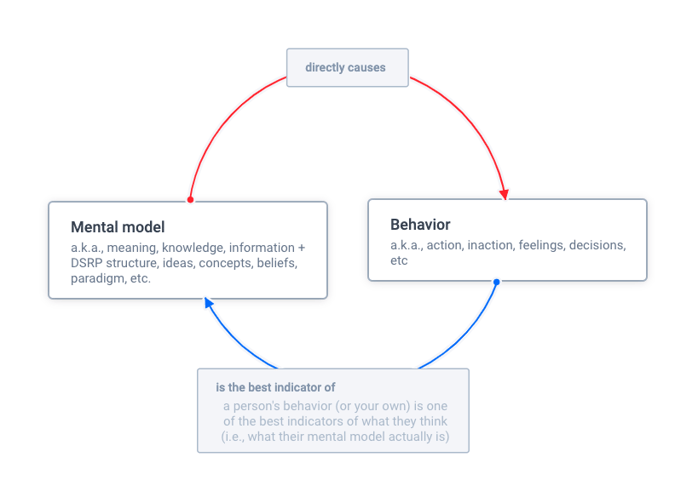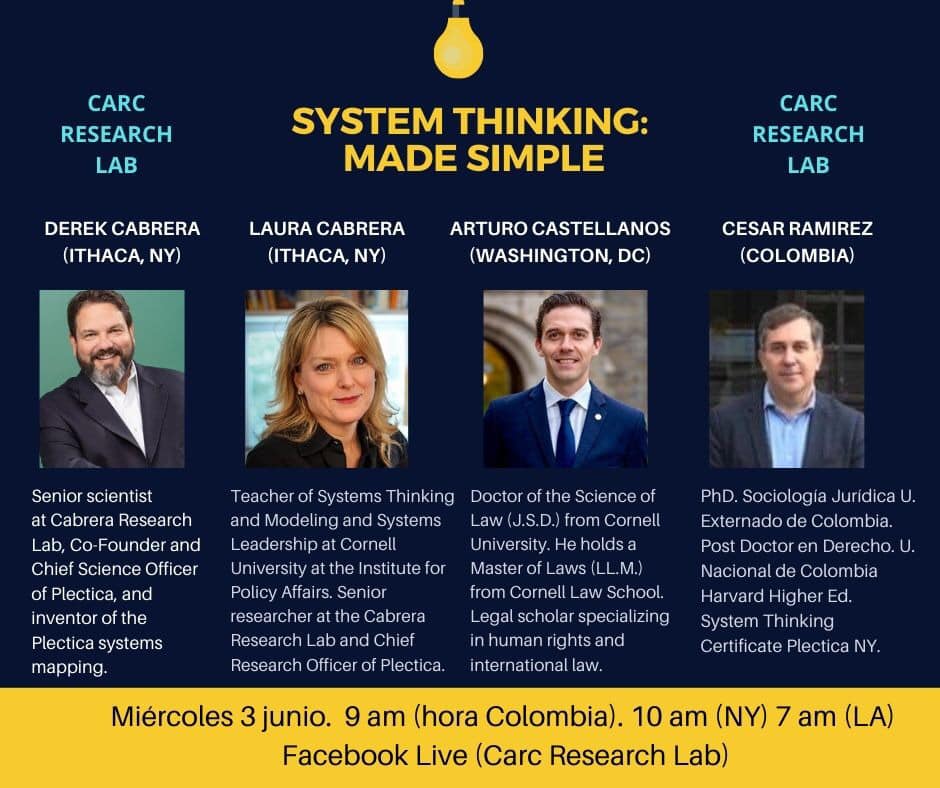Slider: Mental Models Cause Behavior: An Interview with Dr. Derek Cabrera
 Staff
·
5 minute read
Staff
·
5 minute read
Staff: In our work the idea of mental models is prevalent. I know that you have this idea about how mental models cause your behavior. Can you give me sort of a quick overview on what that's about?
Dr. Derek Cabrera: Yeah, I think first and foremost, mental models are happening all the time. There are pervasive mental models that are not just the conscious things that you think, but also the unconscious things that you think. So, when we say that mental models drive behavior, we're not saying that it's always “purposeful,” but that there is a mental model that precedes that behavior. And we've written quite a bit on this idea. Mental models directly cause behaviors. That's a big statement, but your behaviors are a direct result of your mental models.

Staff: If someone has a behavior where they don't know the connection it has to a mental model, how do they go about unearthing that connection?
Dr. Derek Cabrera: The beauty of these kinds of interaction effects is that you can do it from both sides of the fence. If you're pretty clear on what the mental model is, then you can predict what the behavior is going to be. And if you're pretty clear on what the behavior is or has been, then you can backward design to what the mental model must be. Or you can at least hypothesize an educated guess of what that mental model probably looks like. So, you know, a behavior is the best indicator of a mental model and a mental model plays itself out in real life as a behavior.
Staff: So you can use one side of this slider to find the other side?
Dr. Derek Cabrera: Exactly.
Staff: How do you think this Slider plays itself out in the grand scheme of someone's life, in terms of being aware or not being aware of it?
Dr. Derek Cabrera: I think being aware of it just gives you a superpower to be able to understand yourself better. I often say that you might spend 40, 50, even 60 years with a spouse and even then, not every minute of every day of those years. That's a long time. But you're going to spend 80 years with yourself. You're going to spend every day with yourself. You're going to spend every minute with yourself. If by the end of your life you haven't figured out who you are, what makes you tick, and what makes you work, that, to me, seems like a great failure of life. If you've spent 80 years with yourself, you really should know yourself pretty well. That awareness of yourself and what makes you tick should increase over time.
Staff: Right.

Dr. Derek Cabrera: We also have a lot of 20 year olds that don't know themselves. If you're a 20 year old radio, car, or couch, you're what we define as an antique. Anything over 20 years is an antique. And yet in 20 years of being a human, we haven't gotten a firm footing of who we are. That's a failure of parenting and education. That's a cultural fail. We should really focus on helping people to know themselves so that they can understand, how do they learn best? What are their triggers? What causes them to be emotional and then act in “strange” ways? Those are all things that knowing yourself can help you to achieve your potential. And this “M causes B” slider is the cornerstone of understanding, why do I behave this way? What beliefs must I possess to behave in this way? Or, if I keep thinking that X is the true, what behaviors will I exhibit, and what consequences will they have in my life?
Staff: So, you could save yourself a lot of self-inflicted mental pain by realizing, oh, I think X is true, then I'm going to possibly self sabotage or do all these different behaviors as a result of that mental model?
Dr. Derek Cabrera: Right. Imagine if I told you right before you walked into a room of 20 people that all of those people think that you're an idiot, that they hate you, and they’re going to attack you. As you walk into the room believing that mental model, what might be some of the behaviors you're going to see?

Staff: I think you would be nervous...
Dr. Derek Cabrera: You'd be nervous, anxious, insecure, defensive... all those would be the kind of behaviors one could predict. Well, as you walk into any room and you feel nervous, apprehensive, anxious, it might be because someone, namely you, is telling you those things before you walk into that room. So if you're seeing those behaviors, you can make the connection to point out what your mental model is, if your behavior is to take everything defensively and personally? And do I want my mental models to be that way? Because, if a person outside of myself told me that, I'd say, why? Why are you saying that? Why are you telling me this? First of all, how do you even know that, these people don't even know me? And I would question the messenger. Well, a lot of times the messenger is us, and we should question ourselves.
Staff: So being aware of this loop that happens lets you realize the messages you're telling yourself and sort of the self-fulfilling prophecy you're projecting into your life?
Dr. Derek Cabrera: Yeah, it also helps with dealing with things whether you're a parent, teacher, employee, boss or whatever. If you're trying to develop people, you can learn a lot by watching them, by observing them like any good primatologist does, like Jane Goodall. Watch their behaviors and ask yourself, if one person is behaving that way, what must they believe? What must be a mental model in their world or what might be an educated hypothesis about what their mental model is? And then you can go ask them, what do you think about this? What's your mindset about this part of the world? I don't think you can have any kind of sustainable behavior change effort without a slight awareness of this slider. And, a lot of times you're Jane Goodall and the primate you’re observing is you.

Dr. Derek Cabrera: The only other thing I'd say is, you know, behavior includes action, inaction, feelings, and decisions. Those are all behaviors.
Staff: So your emotions are a behavior as well?
Dr. Derek Cabrera: Yeah. Sure. That's a behavioral thing. And mental models mean knowledge, information, ideas, beliefs, concepts, paradigms, and mindsets. So, sometimes we might say, oh, well, that's just something I feel. Well, that's actually your mental model. And then the emotion is your action.
Staff: All right, so you can have a mental model that leads to an emotion, and while you might not be outwardly expressing any of that, you're still behaving based off of a mental model?
Dr. Derek Cabrera: That's what I mean by inaction. So if you have an emotion but you decide not to express it, that inaction is an action. It's a behavior. And so what does that say? Maybe that's saying I have feelings, but I'm not allowed to express them. I have feelings, but if I express them, they won't be accepted. I have feelings, but I have to keep them down inside because they'll hurt me if I let them out, you know? And that mental model needs to be explored, right? It has to be explored. I think if you get that mental model out into the open, you can hopefully see where the truth is in it and where the falsehoods lie in it.
Staff: It seems to me across all of the sliders we have discussed and written about, a key part of them is being able to accept sort of the “humanness” or reality of being human within ourselves.
Dr. Derek Cabrera: Yeah, what I call reality. We are human. A huge part of any kind of DIY self-help or developmental path is to accept reality on its face and to be okay with where you're at. If where you're at is: boy, I'm kind of a jerk. Or if where you're at is: I've got a mental model that I just can't see or I can't get rid of. That's OK. There’s nothing wrong with that. Awareness is never going to hurt.
If you have a mental model that leads to a negative behavior and you know the behavior is negative, and you also know that the flawed mental model is having a negative effect on your life. But, boy, it just is ingrained in you. Well, that's OK. That's very human. All of us have at least 1, 2 or 10 of those. Awareness is only going to help. Just the awareness of that is going to start to help to make changes and make you realize the cost of that mental model and make you realize the cost of those behaviors. You don't have to fix it today. But it's not going to hurt to be aware of it today. Rome wasn't built in a day. But you have to envision it to get started.
Staff: Thank you.
Dr. Derek Cabrera: Thank you.
.png?width=150&height=150&name=CRL%20GOAT%20Logo%20(4).png)



